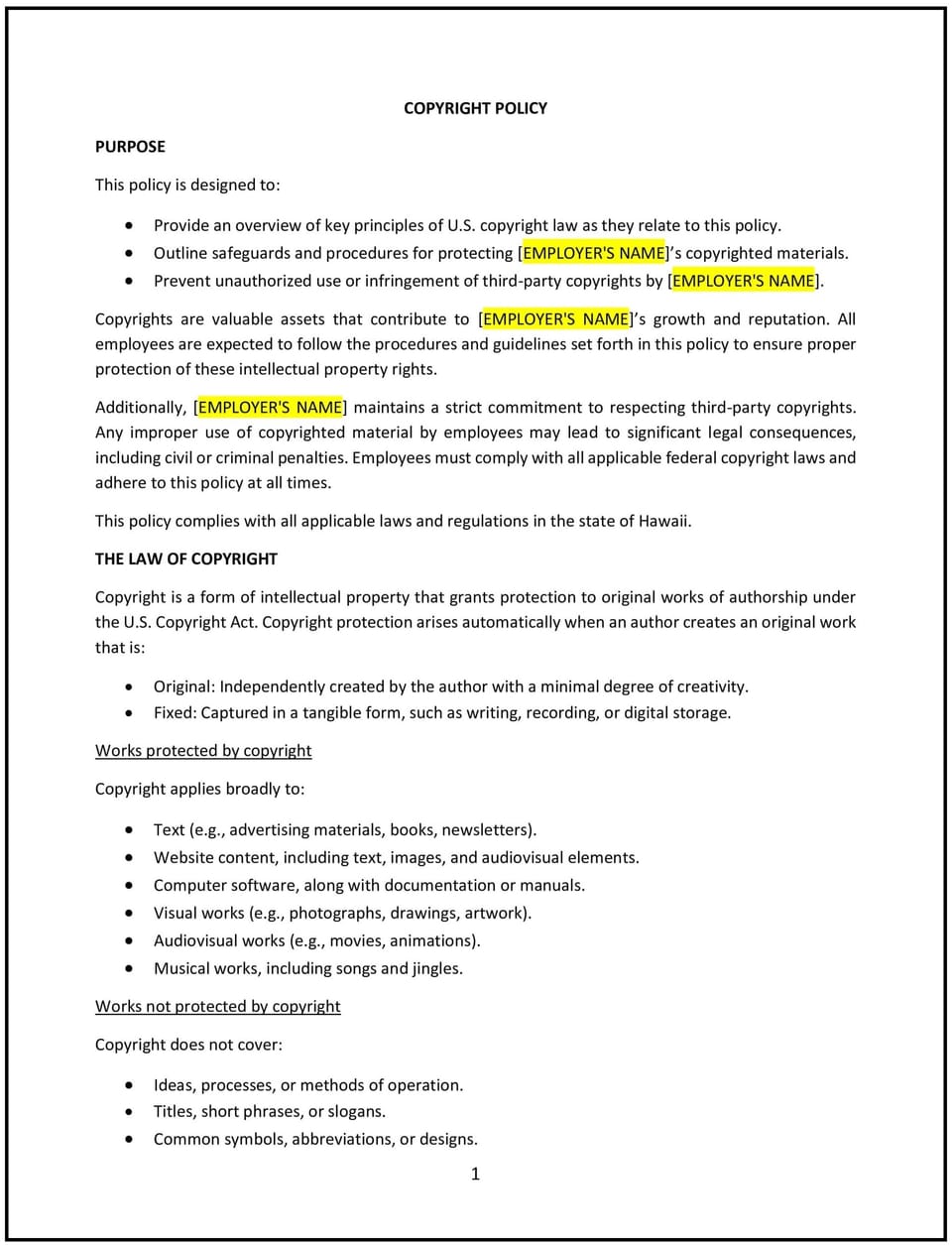Copyright policy (Hawaiʻi): Free template

Copyright policy (Hawaiʻi)
A copyright policy helps Hawaiʻi businesses establish guidelines for protecting original works, respecting intellectual property rights, and avoiding copyright infringement. This policy outlines procedures for creating, using, and sharing copyrighted materials, while addressing Hawaiʻi-specific legal and cultural considerations. It is designed to safeguard the business’s creative assets, promote ethical practices, and reduce the risk of legal disputes.
By implementing this policy, businesses in Hawaiʻi can protect their intellectual property, respect the rights of others, and foster a culture of creativity and innovation.
How to use this copyright policy (Hawaiʻi)
- Define copyright ownership: Specify who owns the rights to works created by employees, contractors, or third parties, such as content, designs, or software developed for the business.
- Establish usage guidelines: Provide rules for using copyrighted materials, including obtaining proper licenses, attributing sources, and avoiding unauthorized reproduction or distribution.
- Protect original works: Outline steps for registering copyrights, marking materials with copyright notices, and enforcing the business’s intellectual property rights.
- Address third-party content: Provide guidelines for using third-party materials, such as images, music, or text, including obtaining permissions and adhering to licensing terms.
- Train employees: Educate staff on copyright laws, the policy’s guidelines, and the importance of respecting intellectual property rights.
- Monitor compliance: Regularly review the use of copyrighted materials to ensure adherence to the policy and address any violations promptly.
- Communicate the policy: Share the policy with employees during onboarding and through internal communications to ensure awareness and understanding.
- Review and update the policy: Regularly assess the policy’s effectiveness and make adjustments as needed to reflect changes in laws, business needs, or industry standards.
Benefits of using this copyright policy (Hawaiʻi)
This policy offers several advantages for Hawaiʻi businesses:
- Protects intellectual property: Clear guidelines help safeguard the business’s original works and creative assets.
- Reduces legal risks: A structured policy minimizes the risk of copyright infringement claims and associated penalties.
- Promotes ethical practices: Respecting intellectual property rights fosters a culture of integrity and accountability.
- Encourages creativity: Protecting original works incentivizes employees to innovate and contribute to the business’s success.
- Builds trust: Demonstrating a commitment to copyright compliance enhances the business’s reputation with clients, partners, and the community.
- Aligns with legal requirements: The policy helps businesses comply with federal copyright laws and industry standards.
- Enhances accountability: Employees understand their responsibilities for using and protecting copyrighted materials.
Tips for using this copyright policy (Hawaiʻi)
- Communicate the policy effectively: Share the policy with employees during onboarding and through regular reminders, such as emails or training sessions.
- Provide training: Educate staff on copyright laws, the policy’s guidelines, and the importance of respecting intellectual property rights.
- Use technology: Implement tools to track and manage copyrighted materials, such as digital asset management systems.
- Monitor compliance: Regularly review the use of copyrighted materials to ensure adherence to the policy and address any violations promptly.
- Be transparent: Clearly explain the policy’s purpose, benefits, and expectations to employees to build trust and cooperation.
- Review the policy periodically: Update the policy as needed to reflect changes in laws, business needs, or industry standards.
Q: Why should Hawaiʻi businesses adopt a copyright policy?
A: Businesses should adopt this policy to protect their intellectual property, reduce legal risks, and promote ethical practices.
Q: What types of works are covered by copyright?
A: Copyright covers original works such as written content, designs, software, music, and images, provided they are fixed in a tangible medium.
Q: How should businesses handle employee-created works?
A: Businesses should specify ownership rights in employment contracts or agreements, typically retaining ownership of works created within the scope of employment.
Q: What are the rules for using third-party content?
A: Businesses should obtain proper licenses, attribute sources, and adhere to licensing terms when using third-party materials.
Q: How can businesses protect their original works?
A: Businesses should register copyrights, mark materials with copyright notices, and enforce their intellectual property rights when necessary.
Q: What training should businesses provide to employees?
A: Businesses should educate staff on copyright laws, the policy’s guidelines, and the importance of respecting intellectual property rights.
Q: How often should the policy be reviewed?
A: The policy should be reviewed annually or as needed to reflect changes in laws, business needs, or industry standards.
This article contains general legal information and does not contain legal advice. Cobrief is not a law firm or a substitute for an attorney or law firm. The law is complex and changes often. For legal advice, please ask a lawyer.


